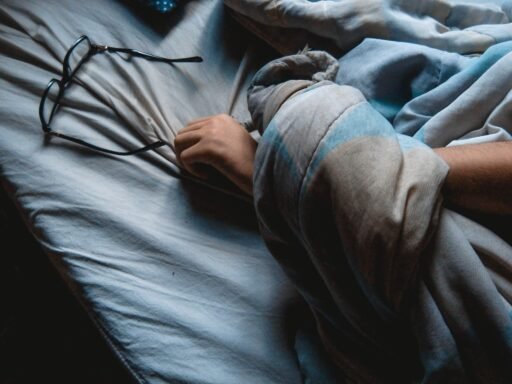Imagine this: It’s late at night, you’re in bed, and the world is quiet. You close your eyes and slowly drift off to sleep…only to be abruptly startled awake by a sudden rush of anxiety. Your heart starts racing, your mind becomes consumed by worries, and sleep seems like an elusive dream. This phenomenon, commonly known as the rush of anxiety when falling asleep, is a puzzling and often unsettling experience that affects many people.
In this article, we will explore the causes of this anxiety and offer some practical tips to help you navigate through it and experience more restful nights. So, sit back, relax, and let’s dive into the intriguing world of the rush of anxiety when falling asleep.
Rush Of Anxiety When Falling Asleep
Overview of the Rush of Anxiety
Have you ever experienced a sudden rush of anxiety when trying to fall asleep? You’re not alone. Many people struggle with this overwhelming feeling of fear and unease as they lay in bed, hoping for a good night’s rest. Understanding the rush of anxiety when falling asleep is essential in finding ways to manage and overcome this challenging experience.
Causes of the Rush of Anxiety
The rush of anxiety when falling asleep can stem from various causes. One common trigger is racing thoughts and worries that seem to intensify at night when there are fewer distractions. Your mind may wander to stressors from the day, upcoming tasks, or unresolved issues. Additionally, high levels of stress and anxiety throughout the day can carry over into bedtime, making it challenging to relax and fall asleep peacefully.
Symptoms of Anxiety
The symptoms of anxiety when falling asleep can vary from person to person. Some individuals may experience a rapid heartbeat, sweating, and a feeling of impending doom. Others may have difficulty breathing or feel a tightness in their chest. Restlessness, muscle tension, and racing thoughts are also common symptoms. These physical and mental manifestations can make it extremely difficult to calm your mind and drift off into a peaceful sleep.
Risk Factors for the Rush of Anxiety
Certain factors can increase the likelihood of experiencing the rush of anxiety when falling asleep. Individuals with a history of anxiety disorders, such as generalized anxiety disorder (GAD) or panic disorder, may be more prone to this nighttime anxiety. Similarly, individuals who have experienced traumatic events or have chronic stress in their lives may also be at a higher risk. Understanding these risk factors can help in developing effective strategies to manage the rush of anxiety and improve sleep quality.
Effects of the Rush of Anxiety
Impact on Sleep Quality
The rush of anxiety can significantly impact sleep quality. When consumed by anxious thoughts, falling into a deep and restorative sleep becomes challenging. Many individuals find themselves waking up multiple times throughout the night or experiencing trouble falling back asleep after waking up. Consequently, the tiredness and lack of sleep can contribute to a cycle of increased anxiety and decreased well-being.
Physical Consequences
In addition to the mental and emotional toll, the rush of anxiety when falling asleep can have physical consequences. Lack of quality sleep can lead to symptoms such as fatigue, headaches, and decreased immune function. Over time, chronic sleep deprivation due to anxiety can increase the risk of developing various health conditions, including cardiovascular problems and weakened immune responses.
Mental and Emotional Implications
The rush of anxiety when falling asleep can take a significant toll on mental and emotional well-being. Sleep deprivation and the constant battle with nighttime anxiety can lead to increased irritability, mood swings, and difficulty concentrating during waking hours. Prolonged periods of poor sleep quality and heightened anxiety can also increase the risk of developing or exacerbating mental health conditions, including depression and anxiety disorders.
Identifying and Managing the Rush Of Anxiety When Falling Asleep
Recognizing and Differentiating Anxiety from Normal Sleep Patterns
To effectively manage the rush of anxiety when falling asleep, it is crucial to recognize and differentiate between anxiety-induced sleep patterns and normal sleep patterns. While occasional difficulty falling asleep or experiencing anxious thoughts before bed is relatively common, persistent and intense anxiety that significantly impacts sleep quality may indicate a more significant underlying issue. If you find yourself consistently struggling to sleep due to anxiety, it may be beneficial to seek professional guidance.
Sleep Hygiene and Relaxation Techniques
Practicing good sleep hygiene and incorporating relaxation techniques into your bedtime routine can help manage the rush of anxiety. Establishing a regular sleep schedule, maintaining a comfortable sleep environment, and engaging in relaxation activities, such as reading or taking a warm bath, can signal to your body that it’s time to wind down and relax. Deep breathing exercises, progressive muscle relaxation, and guided imagery are also effective techniques to alleviate anxiety and promote relaxation before sleep.
Cognitive Behavioral Therapy (CBT)
Cognitive Behavioral Therapy (CBT) is a therapeutic approach that can be highly effective in managing the rush of anxiety when falling asleep. CBT focuses on identifying and challenging negative thought patterns and beliefs that contribute to anxiety. Through CBT, individuals can learn coping mechanisms and strategies to reframe their thoughts and develop healthier sleep habits. Working with a qualified therapist trained in CBT can provide invaluable support and guidance on the journey to overcoming sleep anxiety.
Medication and Professional Help
In some cases, medication may be prescribed to help manage the rush of anxiety when falling asleep. Antidepressants or anti-anxiety medications can be used under the guidance of a healthcare professional. It is essential to consult with a doctor or psychiatrist to determine if medication is appropriate for your specific situation. Additionally, seeking professional help, such as therapy or counseling, can provide the necessary support and guidance to address the root causes of anxiety and develop effective coping mechanisms.
Establishing a Bedtime Routine
Creating a consistent and relaxing bedtime routine can significantly impact the rush of anxiety when falling asleep. Establishing a routine that incorporates calming activities, such as reading or listening to soothing music, can signal to your body and mind that it’s time to unwind and prepare for sleep. Consistency is key, so try to maintain the same routine every night to help promote better sleep hygiene and alleviate anxiety.
Addressing Underlying Issues and Triggers
To effectively manage the rush of anxiety when falling asleep, it is essential to address and explore any underlying issues or triggers that may be contributing to this experience. This may involve identifying and resolving sources of stress in your life, seeking therapy to work through past traumas or unresolved emotions, or making positive lifestyle changes to promote overall well-being. Taking steps to address these underlying factors can significantly reduce nighttime anxiety and improve sleep quality.
Alternative Approaches to Addressing the Rush Of Anxiety When Falling Asleep
Natural Remedies and Supplements
Natural remedies and supplements can provide additional support in managing the rush of anxiety when falling asleep. Some individuals find relief from herbal supplements such as valerian root, chamomile, or lavender. Additionally, incorporating calming teas or essential oils into your bedtime routine can promote relaxation and create a more soothing sleep environment.
Breathing Exercises and Meditation
Practicing deep breathing exercises and meditation can be powerful tools to calm the mind and alleviate anxiety when falling asleep. Focusing on slow, deep breaths and being present in the moment can help shift your attention away from anxious thoughts. Guided meditation apps or videos can be useful resources to guide you through these practices.
Regular Physical Activity
Engaging in regular physical activity has been shown to reduce anxiety and improve sleep quality. Exercise releases endorphins, which are natural mood boosters and can help regulate sleep patterns. Incorporating activities such as walking, jogging, yoga, or other forms of exercise into your daily routine can promote better physical and mental health, making it easier to manage the rush of anxiety when falling asleep.
Journaling and Expressive Writing
Writing down your thoughts and emotions can provide a helpful outlet for managing anxiety when falling asleep. Journaling before bed allows you to release any worries or concerns onto paper, helping to free your mind and promote relaxation. Expressive writing, where you explore and reflect on your feelings in a structured manner, can also aid in reducing anxiety and improving sleep quality.

Tips for Coping with the Rush of Anxiety When Falling Asleep
Creating a Calming Sleep Environment
Creating a calming sleep environment is essential for managing the rush of anxiety. Ensure your bedroom is dark, quiet, and at a comfortable temperature. Optimize your bedding and pillows for maximum comfort. Consider utilizing white noise machines or earplugs to block out any disruptive sounds that may increase anxiety.
Avoiding Stimulants and Screen Time Before Bed
Stimulants such as caffeine or nicotine can heighten anxiety and make falling asleep more difficult. Limit your intake of these substances, especially in the hours leading up to bedtime. Additionally, avoid screen time (e.g., smartphones, tablets, TVs) at least an hour before bed as the blue light emitted from screens can interfere with your sleep-wake cycle.
Engaging in Relaxing Activities
Engaging in relaxing activities before bed can help calm your mind and signal to your body that it’s time to sleep. Consider activities such as reading a book, taking a warm bath, listening to calming music, or practicing gentle stretching or yoga. Find what works best for you and make it a consistent part of your bedtime routine.
Applying Relaxation Techniques
Implement various relaxation techniques to help manage the anxiety when falling asleep. Deep breathing exercises, progressive muscle relaxation, or listening to guided meditations can promote relaxation and alleviate anxiety. Experiment with different techniques to find what resonates with you and incorporate them into your daily routine.
Seeking Support from Loved Ones
It’s important to reach out to loved ones for support when dealing with the rush of anxiety when falling asleep. Sharing your struggles with a trusted friend or family member can provide comfort and understanding. Sometimes, simply talking about your anxieties can help alleviate some of the burdens you carry.
Professional Help for the Rush Of Anxiety When Falling Asleep
Consulting with a Therapist or Mental Health Professional
If the rush of anxiety when falling asleep persists or significantly interferes with your daily life, seeking help from a therapist or mental health professional is paramount. A trained professional can provide guidance, support, and evidence-based interventions to help manage and overcome sleep anxiety. Therapy sessions can help you explore the underlying causes of your anxiety and develop coping strategies tailored to your specific needs.
Exploring Medication Options
For some individuals with severe sleep anxiety, medication may be a viable option. Consult with a healthcare professional, such as a psychiatrist or general practitioner, to discuss the potential benefits and risks of medication. They can help determine if medication is appropriate for your situation and prescribe the most suitable medication if necessary.
Therapeutic Approaches for Sleep Anxiety
Various therapeutic approaches can be beneficial for addressing sleep anxiety. Techniques such as cognitive-behavioral therapy for insomnia (CBT-i), exposure therapy, and eye movement desensitization and reprocessing (EMDR) may be utilized by therapists to help individuals overcome sleep anxiety. These evidence-based treatments aim to reduce anxiety, modify negative thought patterns, and improve overall sleep quality.

Understanding the Connection Between Anxiety and Sleep
The Bidirectional Relationship
Anxiety and sleep share a bidirectional relationship – anxiety can disrupt sleep, and inadequate sleep can exacerbate anxiety. Anxiety can make it challenging to fall asleep, stay asleep, or achieve restful sleep. Conversely, lack of quality sleep can heighten anxiety symptoms, leading to a vicious cycle. Recognizing and addressing this bidirectional relationship is crucial for effectively managing both anxiety and sleep disturbances.
Impact on Mental Health
The rush of anxiety when falling asleep can significantly impact mental health. Sleep disturbances caused by anxiety can contribute to increased irritability, difficulty concentrating, and decreased overall well-being. Prolonged periods of poor sleep quality can also increase the risk of developing or exacerbating mental health conditions, including depression and anxiety disorders. By addressing sleep anxiety, you can promote optimal mental health and well-being.
Role of Stress in Sleep Anxiety
Stress plays a significant role in sleep anxiety. High levels of stress during the day can carry over into bedtime, making it difficult to relax and fall asleep peacefully. Additionally, the rush of anxiety when falling asleep can be triggered by racing thoughts and worries related to stressors in your life. Effectively managing stress through stress reduction techniques can help alleviate sleep anxiety and promote better overall sleep quality.
The Role of Sleep Disorders in the Anxiety
Sleep Anxiety and Insomnia
Insomnia and sleep anxiety often go hand in hand. Insomnia is characterized by difficulty falling asleep, staying asleep, or waking up too early, leading to impaired functioning during waking hours. The rush of anxiety when falling asleep can contribute to insomnia symptoms, making it even more challenging to achieve restorative sleep. Addressing sleep anxiety is vital in managing insomnia and improving sleep quality.
Sleep Apnea and Anxiety
Sleep apnea, a sleep disorder characterized by pauses in breathing during sleep, can also trigger anxiety symptoms. The disruptions in sleep caused by sleep apnea can lead to excessive daytime sleepiness, irritability, and difficulty concentrating. These factors can contribute to heightened anxiety and further exacerbate the rush of anxiety when falling asleep. Treating sleep apnea through methods such as continuous positive airway pressure (CPAP) therapy may help alleviate both sleep apnea and anxiety symptoms.
Restless Legs Syndrome (RLS) and Anxiety
Restless Legs Syndrome (RLS) is a neurological condition that causes an irresistible urge to move the legs, often accompanied by uncomfortable sensations. Individuals with RLS may experience heightened anxiety due to the discomfort and sleep disturbances caused by the condition. Addressing RLS symptoms, such as implementing lifestyle changes or medications, can help reduce anxiety and improve sleep quality.
Prevention Techniques for the Anxiety
Stress Management and Mindfulness Practices
Preventing the rush of anxiety when falling asleep starts with effective stress management and mindfulness practices. Engaging in activities that help manage stress, such as exercise, meditation, or practicing mindfulness, can reduce anxiety levels. By incorporating these practices into your daily routine, you can proactively reduce the likelihood of experiencing the rush of anxiety when falling asleep.
Maintaining a Consistent Sleep Schedule:
Maintaining a regular sleep schedule is a vital prevention technique for sleep anxiety. Going to bed and waking up at consistent times each day helps regulate your body’s internal clock and promotes better sleep quality. By prioritizing and committing to a consistent sleep schedule, you can establish healthy sleep patterns and reduce the likelihood of anxiety interfering with your sleep.
Avoiding Late-Night Stimulating Activities
To prevent the rush of anxiety when falling asleep, it is essential to avoid engaging in stimulating activities close to bedtime. Stimulating activities, such as vigorous exercise, consuming caffeinated beverages, or engaging in intense discussions, can activate your mind and make it more difficult to relax and fall asleep peacefully. Instead, opt for calming activities and wind-down rituals in the hours leading up to bedtime.
Creating a Safe Sleep Environment
Creating a safe sleep environment is a proactive way to prevent anxiety when falling asleep. Eliminate any potential sources of stress or anxiety in your bedroom, such as clutter or excessive noise. Ensure your sleep environment promotes relaxation and comfort, with a comfortable mattress, supportive pillows, and calming elements such as soft lighting or soothing scents.
Summary: Rush Of Anxiety When Falling Asleep
Recognizing the rush of anxiety when falling asleep as a common sleep experience is essential in understanding and addressing this issue. By identifying the various causes and risk factors, individuals can develop strategies to manage sleep anxiety effectively. Incorporating relaxation techniques, adopting a consistent bedtime routine, and seeking professional help are all valuable steps in overcoming the rush of anxiety and improving sleep quality.
Additionally, understanding the bidirectional relationship between anxiety and sleep, as well as the role of sleep disorders, provides insight into the complexity of managing sleep anxiety. By implementing prevention techniques, individuals can proactively reduce the likelihood of experiencing the rush of anxiety. Remember, seeking help and support is crucial when dealing with sleep anxiety, as finding appropriate strategies can significantly improve overall well-being and sleep quality.
Frequently Asked Questions:
- Why do I get anxiety at night when trying to sleep? Anxiety at night can be triggered by various factors such as stress, overthinking, or an overactive mind. Developing relaxation techniques or discussing concerns with a professional may help alleviate this anxiety.
- How do I stop worrying and falling asleep? Establishing a bedtime routine, practicing relaxation exercises, and addressing concerns during waking hours can contribute to reducing worry and promoting better sleep.
- Why do I suddenly jolt awake when falling asleep? Sudden awakenings, often accompanied by a jolt, can be linked to hypnic jerks or anxiety. Identifying contributing factors and addressing them with a healthcare professional may help.
- Why do I get a sudden rush of anxiety? A sudden rush of anxiety can result from stressors, intrusive thoughts, or underlying anxiety disorders. Exploring coping mechanisms or seeking professional guidance may be beneficial.
- Why do I wake up at 3 am with anxiety? Waking up at 3 am with anxiety could be due to various factors, including stress, hormonal imbalances, or an irregular sleep pattern. Identifying the cause can guide appropriate interventions.
- Can sleep anxiety be cured? Sleep anxiety can be managed and improved with the help of therapeutic techniques, lifestyle changes, and, if necessary, medication. Seeking professional advice is recommended.
- What are symptoms of sleep anxiety? Symptoms of sleep anxiety may include racing thoughts, difficulty falling asleep, and persistent worry about sleep. Consulting a healthcare provider can help identify and address these symptoms.
*Source: Anxiety

